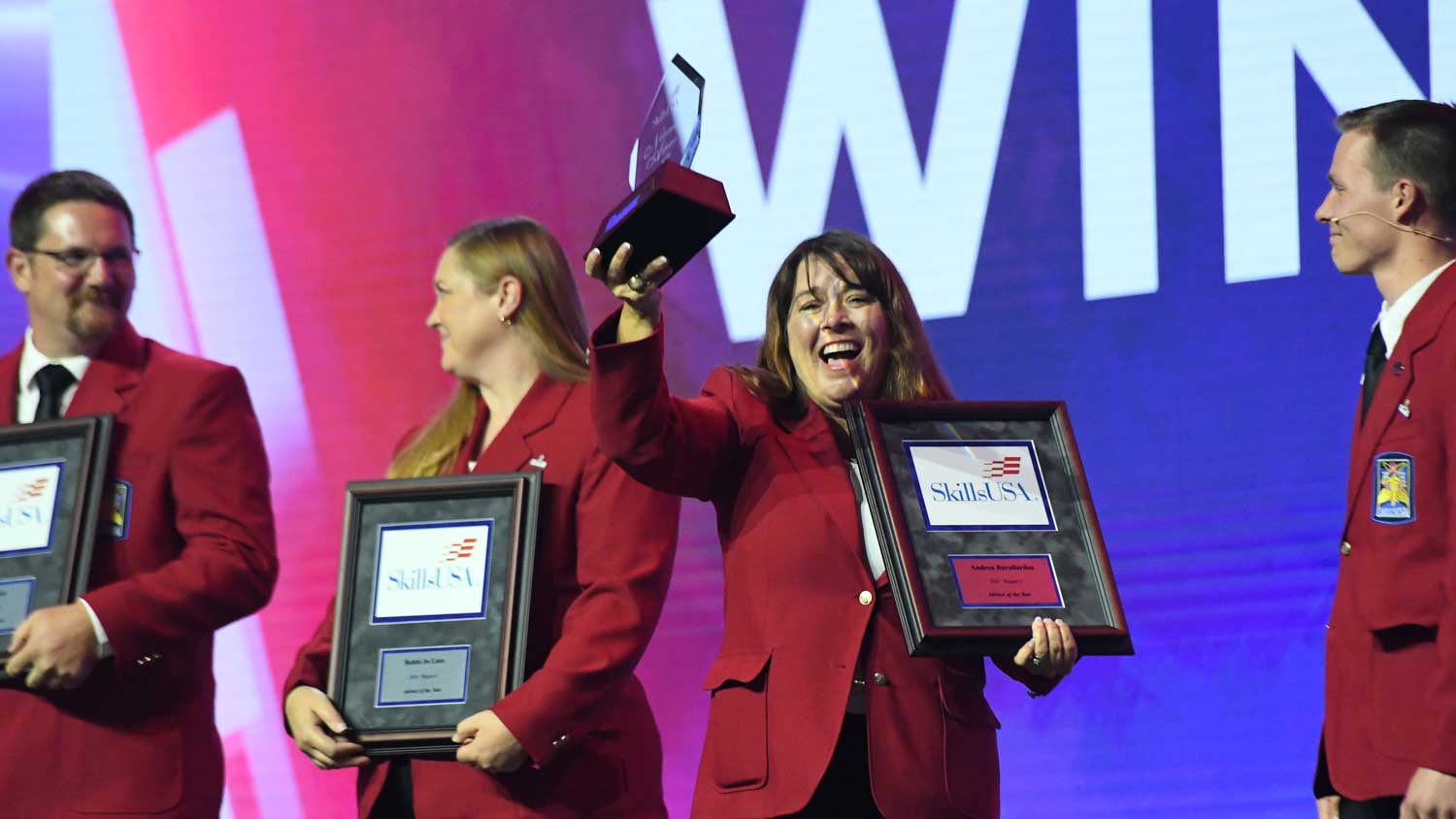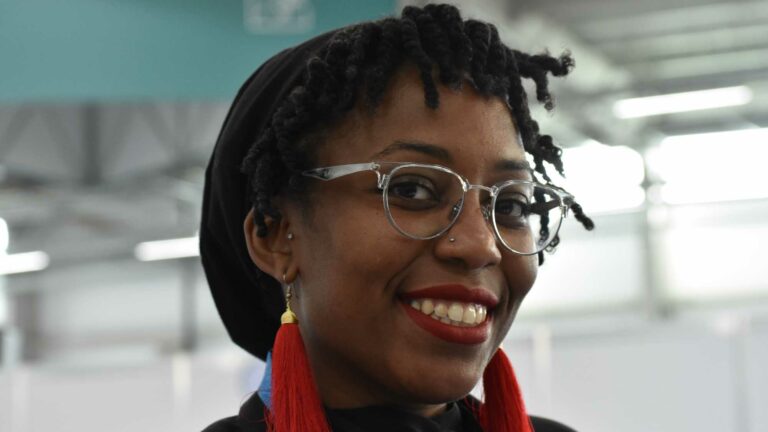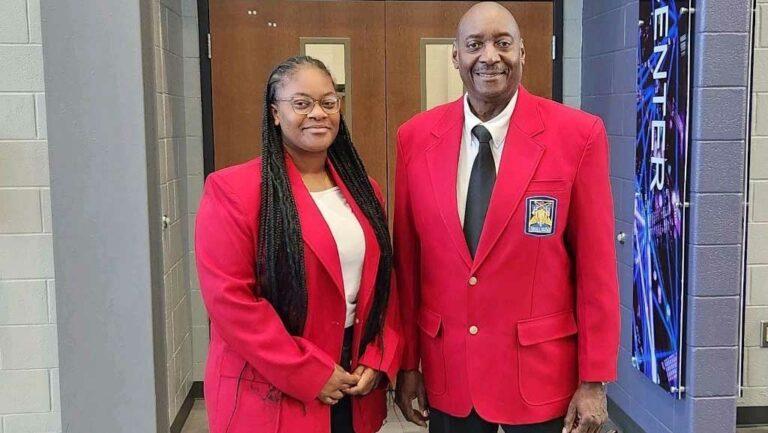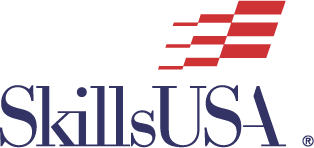Photo by Lloyd Wolf.
Andrea Barallardos wears a lot of hats. The Douglas (Ariz.) High School advisor teaches engineering, advanced placement physics, works as the chair for the science department and she is a STEM coach and SkillsUSA advisor. Oh, and in her ‘free time’ she’s wife and mother with both dogs and pigs to care for. Asked how she does it all, she replies, “You’d be surprised at how much you can actually accomplish if you just keep going, you know?”
That sounds easy enough to say, but how does it work in the real world? “I found out what the real world was when I became a career and technical education teacher,” Barallardos says, “So, when I actually incorporated engineering into my class and my coursework, I actually had the real application of CTE.”
But it wasn’t until Barallardos joined SkillsUSA and learned about the SkillsUSA Framework that she truly understood the true magic of students taking the lead in their own growth and development. She believes that SkillsUSA and the Framework are what drives these students to be successful. “This is the key,” she says.

The SkillsUSA Framework ensures students develop a skill set demanded by business and industry. The three components of Personal, Workplace and Technical Skills include 17 Essential Elements that encompass all skills needed to be successful at home, in school, in SkillsUSA or in the workplace. For Barallardos, that means integrating these Framework Essential Elements into her classroom. “I try to tell the other advisors that the key is integrating the Framework, which teaches students to be responsible, to have a good work ethic, to be able to communicate and to be able to do planning, organizing and management,” she says.
Barallardos says she can always tell when a student begins to truly understand the principles behind the Framework. “I can see that students actually understand the Framework when they can articulate it to somebody else, or when I see them automatically training someone else without me even asking them,” she explains.
You Have to Learn to Sell It
According to Barallardos, it’s the practice or applying these principles to different activities that makes all the difference in the students’ approach. “That’s when you actually see them go from being shy and introverted and not wanting to do a lot, to all of a sudden selling you on something,” she says.
“If they’re going to be an engineer in industry, it’s not just about being an engineer,” Barallardos explains. She points out that students must be able to sell concepts, designs and ideas to other people in order to make the work move forward. “No one’s going to care that you have an idea or design until you can sell it to somebody,” she says. “So, we really focus on that in the classroom.”
Barallardos even uses the Framework with students who aren’t part of SkillsUSA. “The Framework changed my whole philosophy about teaching,” she says. “Now in all of my classes, regardless of if the students are in SkillsUSA or not, they learn all these different things.”
She sees the results of her hard work all the time. Last year, the chapter participated in SkillsUSA’s Chapter Excellence program and applied for the Models of Excellence Award. “My students were super passionate and they won,” Barallardos says. “I have a student with a stutter and he was so nervous about coming,” she said. But through hard work and preparation, Barallardos said the student felt ready to present. “He was so prepared by going through my classes, that when he got there, he was confident. Even with his stutter and a little bit of a lisp, he won!” she says. “His confidence level went from low to way up high.” The student simply thanked her saying, “You made me believe in myself.”
Service Efforts Showcase the Chapter
Community service is a big part of her chapter’s efforts. They host an annual ‘Trunk or Treat’ event that draws up to 10,000 participants from the community. They also partner with the city’s water treatment facility to educate residents about not putting flushable wipes in the city’s sewer systems as they cause clogs and are damaging.
One of her students was so inspired by their work with the town, he suggested they begin sharing STEM lessons at the elementary and middle schools. Barallardos incorporated SkillsUSA’s “Jump Into STEM” curriculum, and her students explored demolition engineering, structural engineering and architectural engineering with groups of elementary and middle school students. “The students were really excited,” Barallardos says. “And because we have a 3D printing store, they even 3D-printed trophies for the kids.”

Barallardos says she felt very honored to be named Region 5 Advisor of the Year last spring. She had already been named the Cochise County Teacher of the Year and her school’s chapter received the Jefferson Award from SkillsUSA Arizona. To next be honored regionally and nationally was icing on the cake.
At the 2023 National Leadership & Skills Conference in Atlanta, Barallardos was shocked but thrilled to be named the SkillsUSA Advisor of the Year, with instant tears, cheers and smiles on the big stage with her peers. She says she was incredibly impressed by the other four multi-talented co-nominees. “All of these advisors were so amazing!” she says.
And today the SkillsUSA world knows what Barallardos’ students already knew — she is that unique teacher they will always remember who made learning fun and who worked to make a difference for them and their future success.
Meet the Regional Advisors of the Year
Peggy Reilly-O’Brien | Region 1 (Massachusetts)

Peggy Reilly-O’Brien, a dental assisting instructor and SkillsUSA chapter coordinator at Cape Cod (Mass.) Regional Technical High School, believes wholeheartedly in career and technical education. “After 31 years, how could I not?” she says. “Anyone who thinks that students who attend a vocational school are ‘less than’ the students at a general education high school doesn’t understand the rigor and value of a vocational education.” Reilly-O’Brien began her career as a Registered Dental Hygienist working in New York City and New Jersey. After several years, she went back to school and worked part-time while attending New York University to earn a Bachelor of Science in Dental Health Education and a Master’s in Health Education.
Wanting to leave the busy city, she moved to Cape Cod and returned to clinical dental hygiene while teaching as an adjunct instructor at Cape Cod Community College for eight years. In 1992, she answered an employment ad for a health teacher at Cape Cod Regional Technical High School, where she taught health classes while helping to develop a new Dental Assisting program. Once the program was opened, she became the Dental Assisting Theory instructor, as well as continuing to teach health classes, along with Anatomy and Physiology for the health sciences.
A few years later, she was asked to mentor Dental Assisting students competing in SkillsUSA. Within a few years, she became deeply immersed in the program and expanded her involvement as a SkillsUSA chapter advisor, becoming the school coordinator in 2018.
Reilly-O’Brien now teaches Radiology Theory to seniors but is mostly focused on SkillsUSA as the school coordinator. She calls her involvement “the fun stuff” and hopes to continue a few more years before passing the torch. She has also coordinated the SkillsUSA Massachusetts Health Knowledge Bowl competition for the past six years.
Reilly-O’Brien is an advocate for what career and technical education and SkillsUSA can do for a student, “The thing that I really like about not just teaching at a vocational school, but also having [SkillsUSA] in vocational school is that broadens the opportunities for these kids,” she says.
Reilly-O’Brien is married, has a son and two Australian Shepherds. When not working, she loves to travel, cook and soak up the sun on the beautiful beaches of Cape Cod.
Steve Icenogle | Region 2 (Alabama)

Steve Icenogle has been the Automotive Service Technology Instructor at Alabama’s Enterprise High School for 19 years. There, he teaches four levels of automotive service courses, including dual enrollment for Lurleen B. Wallace Community College. Icenogle oversees the certification process for his students through Automotive Service Excellence (ASE) and develops relationships with employers in the community for job placement of his graduates.
A teacher for 23 years, Icenogle previously taught Automotive Service Technology at Houston County Career and Technical Center in Ashford, Ala. He decided to pursue a career in education following a positive experience as a student with his own high school mentor and instructor. That experience made him want to use his knowledge of mechanical repair to help others, and he eventually earned master’s level alternative professional certification through Athens State University in 2006. Icenogle’s program has received numerous awards in skill and leadership competitions at the local, district, state and national levels.
Icenogle likes to prepare his students to be well rounded employees in Automotive Service, so he makes sure they get as real of an experience as possible, “We run a simulated workplace. When they come into the classroom, they clock in just like you would in business,” he says, “They rotate different jobs. I have service providers, I have somebody that calls to order parts, you know, somebody that’s a foreman. They all swap around and see various pathways of careers.”
In 2021, he was awarded Teacher of the Year for Enterprise High School and Secondary Teacher of the Year for Enterprise City Schools. In 2022, he was awarded the Alabama Innovator Award by Alabama Works and was named the VFW local and district Teacher of the Year. This year his SkillsUSA chapter earned a gold level Chapter of Distinction in the Chapter Excellence Program. In his free time, Icenogle volunteers at the local Autism Clinic, using his skills to help improve their facilities. He enjoys playing guitar and loves traveling with his family.
Gus Schmid | Region 3 (Illinois)

Gus Schmid is a firefighter paramedic who has served as a Johnsburg High School (JHS) SkillsUSA co-advisor, career and technical education (CTE) ambassador and community liaison. He helps run the Illinois school’s SkillsUSA chapter and seeks industry grants and donations to support their other CTE programs. Schmid was instrumental in the school’s diesel program, which became the second school in the state to receive accreditation by the Associated Equipment Distributors Foundation.
This year, JHS principal Kevin Shelton and Schmid jointly received regional- and state-level “Reaching Out & Building Bridges” awards from the Illinois Principals Association for their collaborative work. Schmid, a JHS alumni, was offered the opportunity to chaperone the 2019 SkillsUSA Illinois conference with his former teacher and current principal Shelton. Attending as a parent, he learned the photography students were missing competition materials and volunteered to get supplies. Shelton encouraged Schmid to become involved, and he was quickly activated as a community member and co-advisor for the JHS SkillsUSA chapter alongside CTE teacher Marty Sands. Since then, Schmid has helped update JHS programs in transformative ways through successful grant writing that demonstrates the value of industry and community partnerships. He also serves as the school drama club technical director in charge of sound, lighting and set construction for theater events. The time, effort and energy Schmid devotes to helping others continues to provide students with meaningful experiences that lead to successful futures. “It’s been a fun journey so far and I’m just honored to be at this point,” Schmid says.
Bobbi Jo Linn | Region 4 (Missouri)

Bobbi Jo Linn became a graphic design instructor at Missouri’s Macon Area Career and Technical Center in 2017 after relocating from New Mexico. Before that, she worked in the graphic design industry for 15 years but felt called to teaching. Moving from a large city in the desert to a small farming community was a big change and a culture shock, but one she calls “well worth it.” Linn believes in the ideals of SkillsUSA and loves to see what the students can accomplish. After only her first year of teaching, she became the SkillsUSA chapter lead advisor and says she has learned and grown right alongside her students. The Macon chapter has grown rapidly from about 20 to 178 students. In the five years she has been the lead advisor, Linn has supported three state officers plus 11 national competitors from her graphic design classes. She views career and technical education and SkillsUSA as important tools and resources to help her students discover what they can become. “It teaches them the skills they need to exceed in their future, whether it be in the workforce or in a classroom earning a degree,” she says. “The value of technical education can be seen by the passion that our students develop, the confidence they develop, and the skills they learn.”
Linn says she doesn’t mind if a student decides graphic design isn’t for them because they have still learned Framework skills in her class, “It’s okay to have some of those students who don’t find it as their passion because they’re learning other employability skills,” Linn says, “They’re learning how to get a job interview, how to hold a job, how to excel in a job.”








